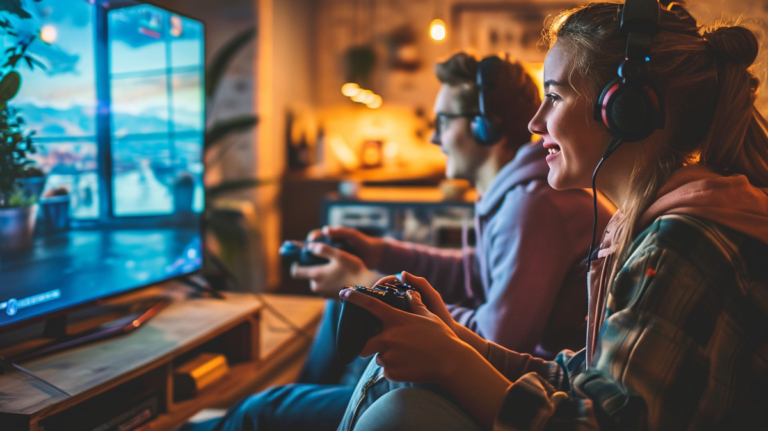
Types Of Dreams That Media Exposure Can Cause
The impact of media like movies, TV shows, and video games on our dreaming mind is a fascinating area of exploration. The content we consume before bedtime can seep into our subconscious, influencing the themes, characters, and narratives of our dreams. These media-induced dreams can range from exhilarating adventures to bizarre, surreal landscapes, providing a unique insight into how external stimuli interact with our internal dream world.
Dreams Inspired by Action Movies and Video Games
Engaging with action-packed media content, such as intense action movies or fast-paced video games, often leads to dreams filled with similar high-energy scenarios. For example, someone who spends a significant amount of time playing a game like “Call of Duty” might find themselves in a dream where they’re part of a military operation, complete with the adrenaline-pumping action and strategic gameplay reminiscent of their gaming experience. These dreams reflect the mind’s absorption of the thrilling, often chaotic energy of such media.
Fantasy and Sci-Fi Worlds
Fans of fantasy or science fiction genres might find their dreams influenced by the complex worlds and narratives of their favorite movies or TV shows. A regular viewer of a show like “Star Trek” might dream about traveling through space, encountering alien species, or engaging in futuristic battles. These dreams can be incredibly detailed, pulling in various elements from the shows or movies, illustrating how deeply our minds can immerse in these alternative realities.
Nightmares Influenced by Scary Media
Watching horror movies or playing horror-themed video games can significantly impact our dream content, often leading to nightmares or unsettling dreams. For instance, after watching a horror film like “The Conjuring,” one might experience dreams populated with ghosts or supernatural occurrences. These dreams can evoke a strong emotional response, mirroring the fear and suspense experienced while consuming the media.
Romantic and Dramatic Themes
Romantic dramas and movies can also shape our dream content, particularly in the emotional and relational aspects. Someone engrossed in romantic dramas might dream about intense relationships or complex emotional scenarios, reflecting the interpersonal dynamics and romantic themes prevalent in these types of media. These dreams often involve a deep exploration of feelings, relationships, and personal desires.
Dreams Influenced by Humor and Fun
Comedies and light-hearted TV shows or movies can inspire amusing and whimsical dreams. A person who watches a comedy like “Brooklyn Nine-Nine” before bed might find themselves in a dream where they are part of a hilarious police investigation, surrounded by quirky characters. These dreams often reflect the humor, lightheartedness, and absurdity of the media content, offering a fun and joyful escape in the dream world.
Nostalgic and Retro Media
Consuming media that is nostalgic or retro in nature can lead to dreams that transport us back in time. For example, watching a classic TV show from the ’90s might result in a dream set in that era, complete with period-specific details and sentiments. These dreams often evoke a sense of nostalgia, reflecting a longing or affection for the past.
Dreams of Chaos and Survival
Media with apocalyptic or dystopian themes, such as “The Walking Dead” or “Mad Max,” can lead to dreams centered around survival in chaotic and challenging environments. These dreams might involve navigating post-apocalyptic landscapes, facing societal breakdowns, or dealing with resource scarcity, mirroring the intense and often bleak nature of such media content.
Conclusion
The dreams influenced by our media consumption offer a compelling glimpse into how external visual and narrative stimuli can weave into the tapestry of our subconscious mind. From action-packed escapades to explorations of fantastical worlds, the content we engage with in our waking hours can profoundly shape the landscapes of our dreams, highlighting the intricate interplay between our real and imagined experiences.
FAQ
1. How does consuming action movies and video games before bedtime affect our dreams?
Engaging with action-packed media like intense action movies or fast-paced video games often leads to dreams filled with similar high-energy scenarios. For example, playing a game like “Call of Duty” might result in dreams about being in a military operation, reflecting the game’s thrilling and chaotic energy.
2. Can fans of fantasy and sci-fi genres see their favorite worlds in their dreams?
Yes, regular viewers of fantasy or science fiction content may find their dreams influenced by these genres. For instance, a “Star Trek” fan might dream about space travel and encounters with alien species, showing how deeply our minds can immerse in these alternative realities.
3. Do horror movies or horror-themed games lead to nightmares?
Watching horror movies or playing horror-themed video games can significantly impact dream content, often leading to nightmares or unsettling dreams. For example, after watching a film like “The Conjuring,” one might experience dreams with ghosts or supernatural occurrences, echoing the fear and suspense of the movie.
4. How do romantic dramas influence our dreaming mind?
Romantic dramas can shape dream content, particularly in emotional and relational aspects. Dreams may involve intense relationships or complex emotional scenarios, reflecting the interpersonal dynamics and romantic themes prevalent in these types of media.
5. Can comedies or light-hearted shows cause amusing dreams?
Yes, comedies and light-hearted TV shows or movies can inspire whimsical and amusing dreams. For instance, watching a comedy like “Brooklyn Nine-Nine” might lead to dreams where one is part of a humorous police investigation, reflecting the media’s humor and absurdity.
6. Does nostalgic or retro media influence our dreams?
Consuming nostalgic or retro media can lead to dreams that transport us back in time, often evoking a sense of nostalgia. Watching a classic show from the ’90s, for example, might result in a dream set in that era, complete with period-specific details.
7. How do apocalyptic or dystopian themes in media shape our dreams?
Media with apocalyptic or dystopian themes, like “The Walking Dead” or “Mad Max,” can lead to dreams about survival in chaotic and challenging environments. These dreams might involve navigating post-apocalyptic landscapes or dealing with societal breakdowns, mirroring the intense nature of the media content.
8. What does the influence of media on our dreams reveal about the subconscious mind?
The impact of media consumption on our dreams highlights how external visual and narrative stimuli can integrate into our subconscious. It shows the intricate interplay between our real and imagined experiences, with our dreams reflecting the themes, characters, and narratives of the media we engage with.

